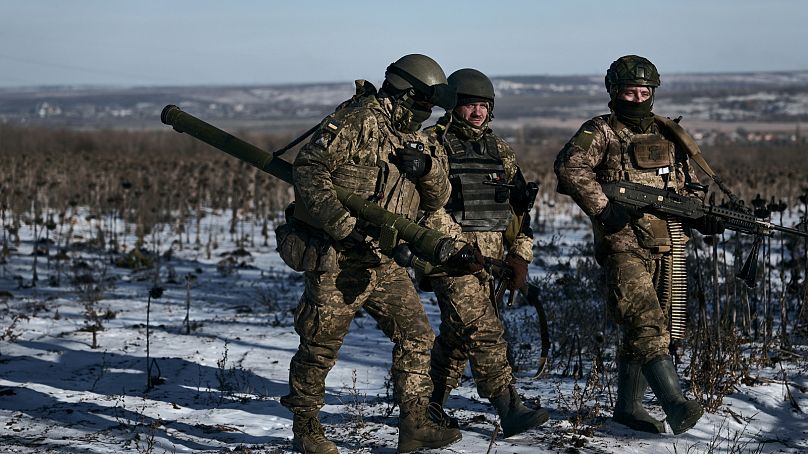Soledar's fall would be a prize for a Kremlin starved of good battlefield news in recent months.
The fate of a devastated salt-mining town in eastern Ukraine hangs in the balance this week in one of the bloodiest battles of Russia's invasion.
Russian forces used jets, mortars and rockets to bombard Soledar in an unrelenting assault.
Soledar's fall, while unlikely a turning point in the nearly 11-month war, would be a prize for a Kremlin starved of good battlefield news in recent months.
It would also offer Russian troops a springboard to conquer other areas of Donetsk province that remain under Ukrainian control, such as the nearby strategic city of Bakhmut.
On the battlefield, a Ukrainian officer near Soledar told The Associated Press the pattern is that first, the Russians send one or two waves of soldiers, many from the private Russian military contractor Wagner Group, who take heavy casualties as they probe the Ukrainian defences.
When Ukrainian troops suffer casualties and are exhausted, the Russians send a fresh wave of highly-trained soldiers, paratroopers or special forces, said the Ukrainian officer, who insisted on anonymity for security reasons.
Ukrainian officials denied Russian claims that Soledar had fallen, but the Wagner Group's founder repeated the assertion of a breakthrough late Wednesday.
“Once again I want to confirm the complete liberation and cleansing of the territory of Soledar from units of the Ukrainian army,” Yevgeny Prigozhin wrote on his Russian social media platform.
“Civilians were withdrawn. Ukrainian units that did not want to surrender were destroyed." He claimed about 500 people were killed and that "the whole city is littered with the corpses of Ukrainian soldiers.”
Ukraine’s military said late Wednesday that Russian forces had suffered “huge losses” in the Soledar fighting.
It is not possible to independently verify either side's claims.
Kremlin spokesman Dmitry Peskov stopped short of declaring the municipality's capture, telling reporters that Russian forces had achieved “positive dynamics in advancing” in Soledar. “Let’s not rush, and wait for official statements,” he added.
Ukrainian President Volodymyr Zelenskyy weighed in Wednesday in his nightly video address: “Now the terrorist state and its propagandists are trying to pretend that some part of our city of Soledar -- a city that was almost completely destroyed by the occupiers -- is allegedly some kind of Russia’s achievement.”
Ukrainian forces in the area are holding out against the Russians, Zelenskyy said.
Soledar, known for salt mining and processing, has little intrinsic value apart from the salt and gypsum mines, but it lies at a strategic point 10 kilometres north of the city of Bakhmut, which Russian forces want to surround.
Taking Bakhmut would disrupt Ukraine’s supply lines and open a route for the Russians to press toward Kramatorsk and Sloviansk, Ukrainian strongholds in Donetsk province.
Soledar’s fall would make “holding Bakhmut much more precarious for Ukraine,” Michael Kofman, the director of Russia Studies at the CAN nonprofit research group, noted.
The war of attrition, with heavy casualties, may make a Russian victory as deadly as a defeat.
“I don’t think the outcome at Bakhmut is that significant compared to what it costs Russia to achieve it,” Kofman said in a tweet.
The Wagner Group, which now reportedly includes a large contingent of convicts recruited in Russian prisons and constitutes up to a quarter of all Russian combatants in Ukraine, has spearheaded the attack on Soledar and Bakhmut.
Delivering victory in Soledar and Bakhmut after months of Russian frontline difficulties would help Prigozhin, who has criticized Gerasimov, increase his clout in what has emerged as somewhat of a rivalry with Russia's military leadership.
Russian troops have struggled to gain control over Donetsk, Luhansk, Kherson and Zaporzhizhia, parts of which the Kremlin illegally unilaterally annexed in September after incorporating the Crimean Peninsula in 2014.
When Russian forces withdrew from Kherson, the battle heated up around Bakhmut.
Putin identified the Donbas region as a focus from the war’s outset, and Moscow-backed separatists have fought there since 2014.
Russia captured almost all of Luhansk during the summer. Donetsk escaped the same fate, and the Russian military subsequently poured manpower and resources around Bakhmut.
The Institute for the Study of War said Russian forces were up against “concerted Ukrainian resistance” around Bakhmut.
“The reality of block-by-block control of terrain in Soledar is obfuscated by the dynamic nature of urban combat ... and Russian forces have largely struggled to make significant tactical gains in the Soledar area for months,” the Washington-based think tank said.
An exceptional feature of the fighting near Bakhmut is that some has taken place around entrances to colossal disused salt mine tunnels, which run for some 200 kilometres, according to Western intelligence reports.












